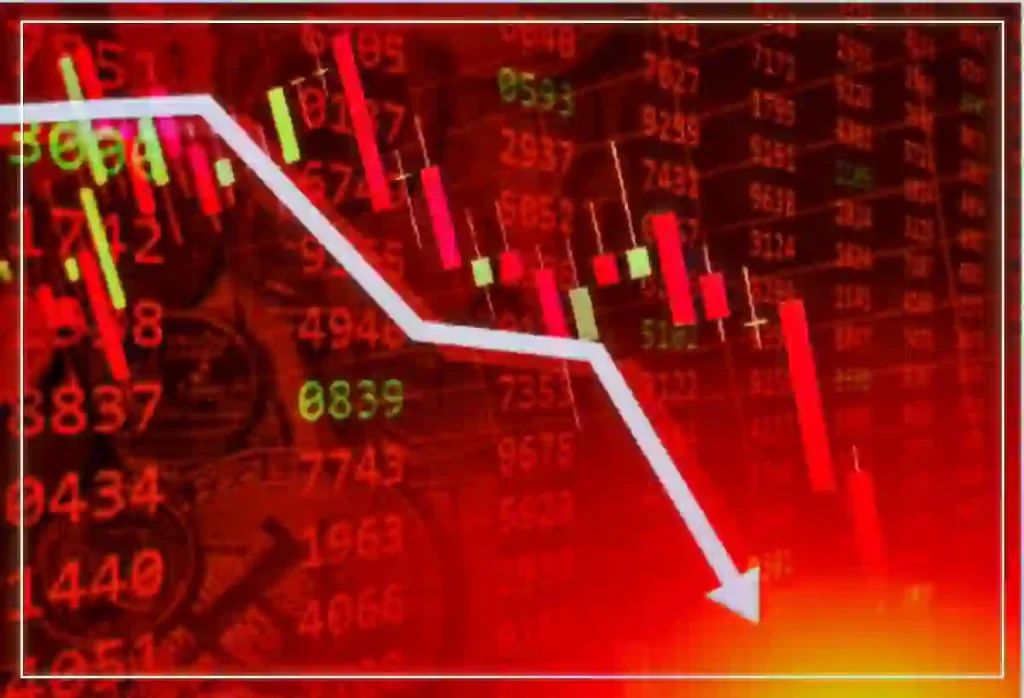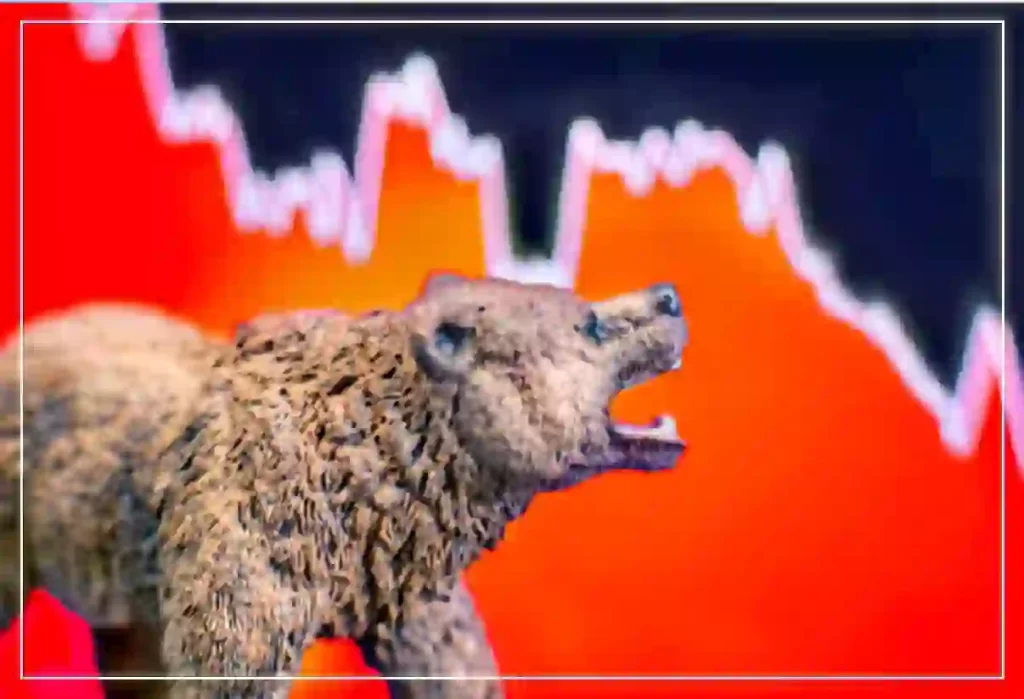A stock market crash is an abrupt and often unexpected decline in the prices of stocks traded on exchanges. This can be caused by a significant event, such as a natural disaster or economic crisis, or it could be the result of long-term problems that have built up in the economy. When faced with a stock market crash, reactionary public panic can majorly contribute to it.
A stock market crash significantly impacts the economy, and an abrupt and significant drop in the general price level of shares traded on a stock exchange over several days causes the market to crash.
Now let’s try and understand why the stock market is crashing. Is there another stock market crash around the corner? And also, could the stock market crash by 40 %?
Is the stock market crashing?
Predicting whether the stock market is crashing is not easy – many renowned investors have failed to do so. A stock market crash typically happens once every few years and differs from a normal correction. The most recent example was the COVID-19-led stock market crash in March 2020. Investors worried about the economy’s overall health and how it would impact the company’s profits and sold their stocks before the storm, which caused a downturn in the market. Additionally, many investors prefer to wait until after a storm has passed before investing in stocks again, as they believe that prices will have lowered and offered more value then.
Because the stock market has been going up without taking into account the risks for more than a year now, some investors feel worried that it’s not in line with the current economic scenario. The companies’ earnings have improved since vaccination drives started and the economies reopened. Although things are still not great, they are better than before the pandemic. The current stock market highs may be unjustified in light of potential risks. Growth stocks are trading at high valuations, which might not be sustainable.
The interest rates are at a record low in many countries, encouraging the economies to get back on their feet. However, if these low rates persist for too long, it could lead to high inflation as people and businesses become more confident in spending money. This can lead to rising prices across the economy and reduced buying power for consumers. The inflation figure rise of 5.4% in June 2021 in the US since 2008 has scared investors. And generally speaking, stock markets do not perform well during an inflationary period. However, commodity-based businesses tend to thrive during these times.
Could the stock market crash by 40%?
It’s a frightening figure, no matter whether you’ve invested in ASX shares or international shares. It is a question that many investors are asking, given the US Federal Reserve’s likely interest rate hike tonight by 0.75% or even 1%.
The NASDAQ-100 index has already been pushed down to 28% this year by the rate hikes of the Fed’s series 2022. Given that the RBA has been raising interest rates, which has also led to an 11% decline in the S&P/ASX 200 Index year-to-date, it is understandable why investors are asking this question.
Nouriel Roubini, CEO of Roubini macro associates, believes that by the end of this year, the global recession will be taking hold and lasting through 2024. This will lead to a full-blown stock market crash resulting in a potential 40% fall in the S&P 500 index. And if a stock market crashed in another part of the world, the same thing would likely happen to the Australian Stock Exchange.
Roubini said, “Even in a plain vanilla recession, the S&P 500 can fall by 30%,” and said, “It’s not going to be a short and shallow recession; it’s going to be severe, long and ugly,” he said. “You have to be light on equities and have more cash.”
A major concern is the mountains of debt held by governments and corporations. Debts will be increasingly difficult to afford as interest rates rise from their current historically low levels. Russia’s invasion of Ukraine and China’s COVID lockdown policies are also putting upward pressure on prices, which will raise rates next year by around 5%.

Why is the stock market crashing?
The Covid-19 pandemic caused a stock market crash in 2020 that affected software, natural gas, real estate, entertainment, and media stocks. However, there was a gradual recovery in 2022. Still, stocks are not doing well. Since the beginning of the year, the S&P 500 has gone down by 20%. The market movement is going further downwards, a concern for investors. Let’s discuss the factors that are causing the crash.
Increase in interest rates
The Fed is looking to reduce inflation by increasing interest rates. This will help control the money supply and hopefully slow down price increases. The increase in interest rates is designed to pressure equities; however, it also affects stocks. When the Fed increases the interest rates, stock prices go down. The opposite happens when they lower the rate- stock prices rise.
Interest rates are rising, and companies are reacting by reducing spending. This is causing an economic slowdown, with corporate earnings likely to moderate. This could lead to stock price declines.
China’s renewed health crisis
The return and spread of the Covid-19 cases in china have impacted stock prices. China’s cero Covid-19 policy has impacted the economy, which resulted in reduced exports and imports. The pandemic has resulted in low supply and increased prices of goods due to global supply chain challenges. This, in turn, could cause a stock market crash as business activity declined.
Inflation
One of the reasons behind the stock market crash is high inflation in the US. Market volatility is increased as the price of goods and services constantly increases. As there is no increase in wages for consumers to cushion them, high inflation burdens them. The profit margins of the companies are affected by inflation as well. Purchasing power and consumer confidence are affected due to high inflation, which has resulted in slower economic growth.
Russia- Ukraine geopolitical tension
Most countries around the globe rely on Russia’s oil, and the Russia-Ukaraine war has caused an unstable market. The sanctions placed on the country have caused a decline in global oil supply, which has led to increased prices and pressure on available resources. Manufacturing businesses that have had to pay higher transportation costs have seen slower growth and lower profits, leading to reduced stock prices.

Conclusion
A stock market crash is an event that occurs once every year and is different from a normal correction. A stock market crash looks like an adverse event, but it is a blessing in disguise for some, so make the most of the next crash. It is a great opportunity to grab cheap deals and buy stocks of companies with strong businesses and robust balance sheets. Also, by investing in a variety of different assets, you can spread your risk out and minimize the impact of a crash that any one security or asset class may have on your overall return. During a bull run, the stock performs well. Hence, it is a good time to weed out the junk stock.
Frequently Asked Questions
A stock market crash can be caused by an extreme event, an economic crisis, or the burst of a long-term speculation bubble.
Q2. Why was the stock market so abruptly crashed?
A stock market crash is a sudden, substantial decline in stock prices. Stock market crashes are often caused by a variety of economic factors including speculation, panic selling, or economic bubbles. They can also occur in the aftermath of an economic crisis, major catastrophe, or a combination of both.
Q3. Will the stock market rebound in 2023?
Although 2023 will be a weak year for global markets, certain economies like India and Korea will likely see growth. The rest of the world will see signs of recovery only if investors wait until 2024.
Q4. What time will it take for stock markets to recover?
While it’s impossible to predict the outcome of this question, it’s likely that the bear market will end and the market will start to recover in 2023. For Fed rate increases to bring about economic stability, it usually takes 12 to 18 months.
Q5. Do you think it is wise to invest now in the stock exchange?
If your savings are sufficient to purchase stocks, and you don’t plan to use the money for more than five years, then jump in. If you invest for the long-term, even when the market drops — 2022 was full of them — you will be able to recover any losses.
